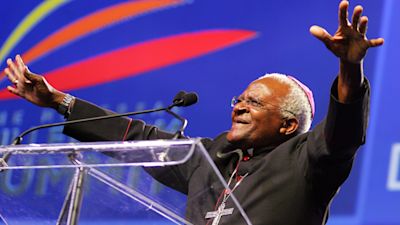Tributes made as anti-apartheid giant Archbishop Desmond Tutu dies aged 90

ITV News Global Security Editor and former Africa Correspondent Rohit Kachroo reflects on the humour, vigour and courage of 'The Arch'
Archbishop Desmond Tutu has died aged 90, South Africa's president has confirmed in a statement.
The Nobel Peace Prize-winning activist for racial justice and LGBT rights was an uncompromising foe of apartheid in South Africa, working tirelessly and peacefully for its downfall.
Tutu’s death on Sunday “is another chapter of bereavement in our nation’s farewell to a generation of outstanding South Africans who have bequeathed us a liberated South Africa,” President Cyril Ramaphosa said in a statement.
“From the pavements of resistance in South Africa to the pulpits of the world’s great cathedrals and places of worship, and the prestigious setting of the Nobel Peace Prize ceremony, the Arch distinguished himself as a non-sectarian, inclusive champion of universal human rights,” he added.
The Desmond and Leah Tutu Foundation, founded by the retired archbishop and his wife, said: “We are devastated that the Arch is no longer with us, but his passing has strengthened our resolve to spread his warmth and compassion even further afield.”
'His place in history, I think, ranks very closely to that of Nelson Mandela': The Archbishop of Canterbury pays tribute
Justin Welby, the Archbishop of Canterbury, described Tutu as “a man of words and action”, adding: "Arch’s [his nickname] love transformed the lives of politicians and priests, township dwellers and world leaders. The world is different because of this man."
Meanwhile, Queen Elizabeth remembered him for his "warmth and humour".
She said: “I am joined by the whole Royal Family in being deeply saddened by the news of the death of Archbishop Desmond Tutu, a man who tirelessly championed human rights in South Africa and across the world.
“Archbishop Tutu’s loss will be felt by the people of South Africa, and by so many people in Great Britain, Northern Ireland and across the Commonwealth, where he was held in such high affection and esteem.”
Prime Minister Boris Johnson also highlighted Tutu's sense of humour.
“He was a critical figure in the fight against apartheid and in the struggle to create a new South Africa – and will be remembered for his spiritual leadership and irrepressible good humour,” he said.
Barack Obama also joined the tributes, sharing a picture of himself in an embrace with his "mentor" and "moral compass".
The former US president wrote: "Archbishop Tutu was grounded in the struggle for liberation and justice in his own country, but also concerned with injustice everywhere," he added.
Tutu had been hospitalized several times since 2015, after being diagnosed with prostate cancer in 1997.
In recent years he and his wife lived in a retirement community outside Cape Town.
Throughout the 1980s - when South Africa was gripped by anti-apartheid violence and a state of emergency giving police and the military sweeping powers - Tutu was one of the most prominent black people able to speak out against abuses.
A lively wit lightened Tutu’s hard-hitting messages and warmed otherwise grim protests, funerals and marches.
The Nobel Peace Prize in 1984 highlighted his stature as one of the world’s most effective champions for human rights, a responsibility he took seriously for the rest of his life.
With the end of apartheid and South Africa’s first democratic elections in 1994, Tutu celebrated the country’s multi-racial society, calling it a “rainbow nation,” a phrase that captured the heady optimism of the moment.
Nicknamed “the Arch,” Tutu was diminutive, with an impish sense of humor, but became a towering figure in his nation’s history, comparable to fellow Nobel laureate Nelson Mandela, a prisoner during white rule who became South Africa’s first Black president.
Tutu and Mandela shared a commitment to building a better, more equal South Africa.
In 1990, after 27 years in prison, Mandela spent his first night of freedom at Tutu’s residence in Cape Town. Later, Mandela called Tutu “the people’s archbishop.”
Upon becoming president in 1994, Mandela appointed Tutu to be chairman of the Truth and Reconciliation Commission, which uncovered the abuses of the apartheid system.
Tutu campaigned internationally for human rights, especially LGBT rights and same-sex marriage.
“I would not worship a God who is homophobic and that is how deeply I feel about this,” he said in 2013, launching a campaign for LGBT rights in Cape Town.
“I would refuse to go to a homophobic heaven. No, I would say, ‘Sorry, I would much rather go to the other place.’”
Tutu said he was “as passionate about this campaign (for LGBT rights) as I ever was about apartheid. For me, it is at the same level.”
He was one of the most prominent religious leaders to advocate LGBT rights. Tutu’s very public stance for LGBT rights put him at odds with many in South Africa and across the continent as well as within the Anglican church.
In July 2015, Tutu renewed his 1955 wedding vows with wife Leah. The Tutus’ four children and other relatives surrounded the elderly couple in a church ceremony.
“You can see that we followed the biblical injunction: we multiplied and we’re fruitful,” Tutu told the congregation.
“But all of us here want to say thank you... We knew that without you, we are nothing.”
Asked once how he wanted to be remembered, he said: “He loved. He laughed. He cried. He was forgiven. He forgave. Greatly privileged."